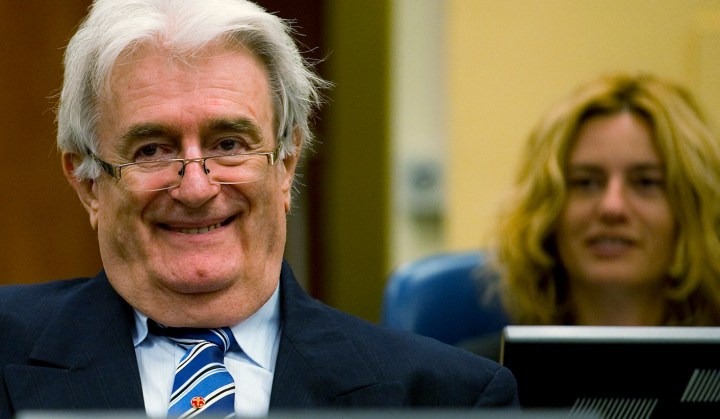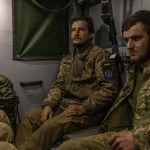Newsdeck
Karadzic denies Bosnia war crimes as he starts defence

Former Bosnian Serb leader Radovan Karadzic, accused of some of the worst atrocities in Europe since World War Two, told judges he should be praised for promoting peace, not charged with war crimes, an assertion hotly denied by victims watching the trial. By Thomas Escritt.
Beginning his defence, Karadzic accused Bosnian Muslims of deliberately staging some of the atrocities against their own people to win international support, drawing gasps of disbelief from Muslim survivors in the gallery of the court on Tuesday.
Karadzic is one of three Serb leaders brought to trial in The Hague for war crimes during the violent break-up of multi-ethnic Yugoslavia between 1991 and 1999, in which more than 100,000 people were killed and millions were displaced.
Now 67 and still recognisable by his shock of white hair, he is defending against himself charges of genocide, war crimes and crimes against humanity, and cross-examined witnesses himself.
Looking resigned but relaxed and reading from a pre-written speech, he said Muslims had faked the circumstances of two shellings of a marketplace in the Bosnian capital Sarajevo during a siege by Serb forces. More than 100 people were killed.
“Sarajevo is my city, and any story that we would shell Sarajevo without any reason is untrue,” he said, reiterating long-standing allegations by the Serb side which have already been refuted by the Hague tribunal in an earlier case.
Prosecutors at the International Tribunal for the Former Yugoslavia say Karadzic was jointly responsible for the shelling of Sarajevo when Bosnian Serb forces besieged it from 1992-6.
He is also charged with being behind the massacre of 8,000 Bosnian Muslims in Srebrenica in 1995.
“Instead of being accused, I should have been rewarded for all the good things I have done,” he told the court. “I did everything in human power to avoid the war. I succeeded in reducing the suffering of all civilians.”
Some of the victims expressed disgust at his words.
“It is difficult to even describe how I felt when I heard him saying this,” Kada Hotic, who lost 56 male family members in Srebrenica, told Reuters in Sarajevo.
“I lost so many family members only because they were Muslims in a territory that Karadzic desired to turn into exclusively Serb land. Is that peacemaking?” she said.
MARKET SHELLING
Karadzic said two separate shellings of a Sarajevo market place, in February 1994 and August 1995, in which a total of 105 people were killed and 234 injured, had been orchestrated.
During the trial of Dragomir Milosevic, chief of staff to the commander of the forces besieging Sarajevo, the court found Bosnian Serb forces were responsible for the 1995 shelling.
Karadzic also said a famous press photograph of an emaciated man standing behind barbed wire in what was apparently a concentration camp had been staged.
Fikret Alic, the detainee who appeared in that picture, was watching Karadzic’s statements from the gallery on Tuesday.
“It was a humiliation for me that even today he is maintaining that this story was made up,” he said.
Tribunal judges established in the trial of local leader Milomir Stakic, who was sentenced to 40 years’ imprisonment, that detainees were beaten and tortured in camps including Trnopolje, where Alic was detained.
“This trial has turned into a mockery of both the court and the victims,” said Zumra Sehomerovic, who lost her husband and son at Srebrenica.
Karadzic was warned by a judge that reading lengthy summaries of witness depositions would eat into the 300 hours he had been allocated to defend himself.
HARD TO HIDE
The tribunal has indicted Croats, Muslims, Serbs and Albanians on charges of genocide, war crimes and crimes against humanity in the former Yugoslavia.
The majority were ethnic Serbs, including the former head of state, army chief of staff, defence minister and speaker of the parliament, and many Serbs consider the tribunal to be biased.
For years, it had seemed the main war crimes suspects would stay out of the tribunal’s reach, until political changes in the region made it more difficult for them to hide.
A former psychiatrist, Karadzic was arrested in 2008 in Belgrade, where he had been living in disguise as a new age health guru.
Bosnian Serb military leader Ratko Mladic went on trial in The Hague this year, after 16 years on the run. Former Yugoslav and Serbian president Slobodan Milosevic died in 2006 before the end of his trial.
As Karadzic opened his defence, the tribunal also began the separate trial of its last suspect, the final chapter for an institution that has broken new ground in the investigation of conflicts and paved the way for a permanent war crimes court.
Goran Hadzic, the last of 161 suspects still alive and at large after the Yugoslav wars, is accused of murder, torture and forcible deportation at the very outset of those wars.
Prosecutors say Hadzic, president of the self-proclaimed Republic of Serbian Krajina from 1992-94, was responsible for killings and forced deportations of minority ethnic Croats from the region after Croatia broke away from Yugoslavia in 1991.
Already sentenced in his absence to a total of 40 years in prison by Croatian courts in the mid-1990s, Hadzic w as finally detained by Serbian authorities in 2011. DM
Photo: Former Bosnian Serb leader Radovan Karadzic sits in the courtroom on the first day of his defense against war crime charges at the International Criminal Tribunal for the Former Yugoslavia in The Hague October 16, 2012. The Yugoslavia war crimes tribunal begins trying its last suspect on Tuesday. Karadzic is one of a trio of architects of the Balkan wars brought to trial in The Hague for wars among the successor countries and the peoples of multi-ethnic Yugoslavia between 1991 and 1999, in which well over 100,000 people were killed and millions were displaced. REUTERS/ Robin van Lonkhuijsen




















 Become an Insider
Become an Insider